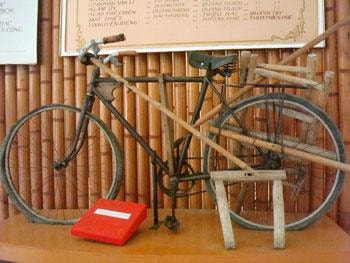The bicycle of the grandmaster Cao Van Ty
(Baonghean) -During the Dien Bien Phu campaign, a bicycle could carry from 100 to 250 kg of goods, but Mr. Cao Van Ty (belonging to the Thanh Hoa porter force) carried 320 kg/trip, everyone admired and called him "The master of bicycle transport".
With the “Impregnable Fortress” along with military experience and modern means of war, the French never imagined the disastrous outcome on May 7, 1954, and even less could they imagine that in Vietnam there were people with bare feet and bare shoulders who quietly wrote miracles, those were the “carry-carrying women and porters” who diligently brought goods to the front lines day and night. In particular, there was a great contribution from the Thanh - Nghe - Tinh rear with tens of thousands of compatriots who enthusiastically went to work as laborers, transporting supplies to ensure logistics for the Dien Bien Phu front hundreds of kilometers away.
 |
In difficult road conditions, lacking rudimentary means of transport, under fierce attacks from the enemy, but with rudimentary bicycles they continuously set many records, carrying from 100 to 250 kg of goods, including Mr. Cao Van Ty (belonging to the Thanh Hoa porter force) carrying up to 320 kg/trip, and was admired by everyone and called "The master of the porter bike". Currently, his porter bike is being preserved and displayed at the Military Zone 4 Museum, a vivid proof of the spirit of overcoming difficulties, overcoming all hardships and the intelligence and creativity of the Dien Bien Phu porters in the past.
Like other vehicles in the frontline militia convoy, Cao Van Ty's bicycle was reinforced with a frame, rim, and handlebar. Along the body of the bicycle, there was an additional crossbar that could carry up to 200kg of rice. The spokes were braced to increase the durability and strength of the bicycle. At the front of the bicycle, a long piece of bamboo was attached as a handlebar, and a shorter piece of bamboo was used for balance and as a brake. With that creativity, the bicycle's load capacity was increased 10-20 times compared to the person carrying it.
To transport goods to the front, the porters used bicycles and were organized into groups. Each group had many platoons, each platoon had from 30 to 40 people and vehicles, including one vehicle carrying spare parts. Most of the roads to the front were newly cleared, steep, narrow and unlit, the person in front had to hang a small white cloth so that the person behind could see the way.
Due to the long journey through the wild and poisonous forests, almost everyone got malaria, not to mention injuries from slippery roads, steep passes and bombs, but Mr. Cao Van Ty discussed with Mr. Bui Tin (a member of the Thanh Hoa porter force, who was twice honored to receive the Uncle Ho Badge and the Third Class Military Exploit Medal) to encourage his brothers to overcome all difficulties.
And the emulation movement of “carrying more, going faster” spread more and more widely throughout the entire route, encouraging everyone to strive. There were steep sections so steep that superiors assigned each vehicle to carry only 60kg of rice, food, medicine and even artillery shells, but the soldiers were still determined to carry at least 100kg each, quickly delivering the goods to the front line. And with that determination, Cao Van Ty set a record of carrying 320kg/trip. Besides, there was also Ma Van Thang (a laborer from Phu Tho province) carrying 270kg/trip...
When commenting on the role of the rear in the Dien Bien Phu campaign, the late General Secretary Le Duan affirmed: "Without Thanh - Nghe - Tinh, there would be no Dien Bien Phu campaign, no victory in the resistance war against the French."
In the 4th Inter-zone alone, mainly the Thanh - Nghe - Tinh region, 250,000 trips of civilian laborers, more than 11,000 bicycles were mobilized to supply and transport 15,000 tons of rice, more than 400 tons of food to support the battlefield. And farmers who were only familiar with plowing like Cao Van Ty, with the rudimentary bicycle as a means and valuable asset of farmers at that time, became real soldiers who contributed to the victory of Dien Bien Phu - the legendary "golden history".
Thanh Nga






